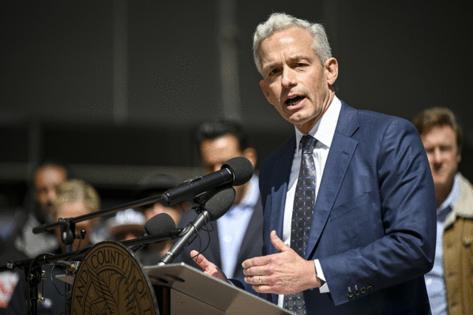Denver DA failed to disclose police records in as many as 756 criminal cases
Published in News & Features
DENVER — The Denver District Attorney’s Office failed to share police records with defense attorneys in as many as 756 criminal cases since 2022, potentially violating court discovery rules, a probe by the office found.
The prosecutors’ discovery software for years diverted Denver Police Department files that included a forward slash in the file name into an “error log that prosecutors were not aware of and could not access,” according to a statement from the office this week and notifications sent to defense attorneys in September.
The misrouted files were not shared with defendants — a potential violation of discovery rules, which require prosecutors to disclose evidence to defendants during a criminal case. The district attorney’s office uncovered what it called a “technical issue” with the software as it reviewed its own practices amid mounting serious sanctions for discovery violations across Colorado.
It was not immediately clear whether all of the files that were diverted into the error log were required to be disclosed to defendants, DA spokesman Matt Jablow said in a statement. But the office nevertheless notified defense attorneys and started the process of sharing all the files “out of caution and to avoid any delay,” he said.
“The DA’s office produced the files, even though, in many of those cases… the information appears to have been produced in a different format, may not have been legally required to be produced, or both,” he said in the statement.
Many of the misplaced files “contained information related to a defendant’s arrest, such as booking photos,” Jablow said. The error log issue most frequently impacted records that included dates in the file names, according to the notification sent to attorneys.
The impact of the technical glitch will vary from case to case depending on the severity of the case, the information in the undisclosed files and how far along in the legal process the case is, said Colin McCallin, a criminal defense attorney and former prosecutor.
Little is likely to change for defendants who have already pleaded guilty and served their sentences in less serious cases, like misdemeanors and petty offenses, he said. But there could be a bigger impact in ongoing prosecutions or more serious cases.
“Obviously, if the evidence is exculpatory, if it suggests the person didn’t commit the crime, that is a big deal; that can lead to serious sanctions,” McCallin said. “…If it is a minor violation, like, ‘Oh, we didn’t get the person’s full criminal history or mugshot’ — that’s probably not going to be a big deal. I would imagine in most lower-level felony cases or misdemeanor cases, I don’t know if anything will happen at all. A lot of those folks will have moved on.”
If the undisclosed material includes exculpatory evidence, it could prompt judges to dismiss cases or defendants to seek post-conviction relief, he added. Judges in ongoing cases might also consider sanctions against prosecutors for the discovery violations alone, regardless of what type of evidence was not disclosed, McCallin said.
“It really does sound like this was a computer issue; it’s not like the DA’s office was sitting on evidence intentionally or purposely withholding evidence,” he said. “I don’t think anyone thinks that. But the problem is, it is still a discovery violation.”
Angela Campbell, co-chair of the Denver chapter of the Colorado Criminal Defense Bar, said the district attorney’s public statements about the software issue have inappropriately minimized the potential impact of the discovery violations.
“The Denver DA’s statement is concerning because it seems to fail to take accountability for the serious discovery violations committed by their office,” she said, adding that defense attorneys are just starting to investigate the missing files and it is too early to know the full impact of the misrouted records.
“Nobody is saying that every single discovery violation was tantamount to a Brady violation — a failure to produce exculpatory evidence — but minimizing the discovery violations that occurred, first of all by saying, ‘Well, it was over 756 cases’ — they’re not just cases. These are 756 human beings,” she said. “People, presumably, who went to prison and endured serious consequences for what may or may not have been material discovery violations that would have impacted the cases. The truth is, right now, that I don’t think we know. And I don’t think they know.”
In a statement, Denver District Attorney John Walsh said prosecutors took “rapid steps” to fix the discovery issue as soon as they recognized it.
“The Denver DA’s Office is fully committed to providing complete discovery to the defense in every case and understands its responsibility to ensure that software issues of this kind do not arise,” he said in the statement.
Campbell questioned why it took prosecutors three years to find the software issue, and compared the situation to the case of now-fired Colorado Bureau of Investigation scientist Yvonne “Missy” Woods, who is accused of mishandling DNA testing in more than 1,000 criminal cases during her 29-year career.
“This is the concern that every criminal defense attorney has, which is, is this going to be another Missy Woods debacle where we don’t know the extent?” she said. “And that’s the problem. When you undermine trust in a public institution, it’s really hard to get back. And that’s why accountability is so important.”
______
©2025 MediaNews Group, Inc. Visit at denverpost.com. Distributed by Tribune Content Agency, LLC.







Comments